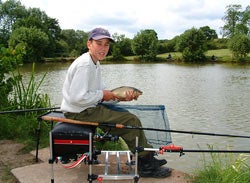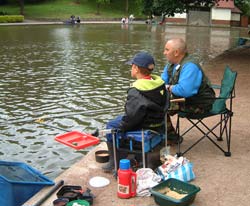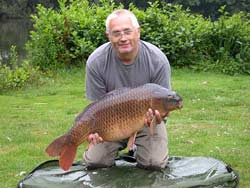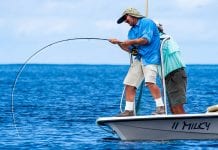| So, you want to go freshwater fishing, do you? In the UK, there are a few essentials that you must have before you even think about going fishing. A basic grasp of angling regulations should save you a lot of bother. Let’s look at each of these in turn, and then provide some basic advice about essential bits of tackle and safety that will make your first trip more likely to be legal, safe and successful.
It all comes down to the law. In England and Wales it is a legal requirement (for those aged 12 and over) to have an Environment Agency rod license to fish for salmon, sea trout, trout, freshwater fish or eels in any water, and this includes estuaries. A few waters are covered by a general license. The easiest way to obtain a license is from any Post Office and the licenses run from the 1st April each year for annual ones. 1 day (£ 3) and 8 day (£ 8) licenses are also obtainable. For coarse fishing (including non-migratory trout), the annual cost is £ 23 (£ 5 for those aged 12-16 years), and covers the use of two rods. There are a complex multitude of regulations to understand, but in a nutshell they are concerned with making angling a sport that recognises essential conservation measures. Vital ones are that foul hooking (deliberate hooking into the fish anywhere other than the mouth area) and leaving rods unattended to fish for themselves are illegal. There are regulations covering the use of keepnets, movement of live fish (livebaits may only be used in the water from where they were caught), seasons when you may fish, and restrictions on using lead weights. For the full details, and there are pages of them, visit www.environment-agency.gov.uk/fish-e. The second requirement is to have permission to fish from the owner or management of the fishery. This may take the form of a day ticket, or membership of a club or syndicate. A few waters are ‘free’ fishing, though someone, often the Environment Agency or the local council, usually owns even these. A good starting point to finding out what water is available is by enquiring in a local tackle shop. Many lake day-ticket venues have an office on site, or riverside signs may give details of who to contact. The other alternative is to use the forums on FISHINGmagic to see if anyone can point you in the right direction (they usually can). Be specific about the lake or stretch of river though, rather than asking too general a question such as – “What fishing is available within thirty miles of London?” For anglers in the South west of England there is a useful guide on www.gethooked.co.uk.
One essential point is that even if there are no signs stating ‘Private Fishing’ it does not mean you can start fishing on the assumption that it is okay. Ignorance is no excuse. Few waters provide for you to start fishing, and then pay for a ticket when the bailiff turns up, though there are exceptions. Furthermore, having obtained your license and permit, it is vital that you understand what regulations may be in force. These may be written in the club rulebook or day ticket. This includes permitted baits and methods, fishing times and seasons. There is also worth acknowledging that a certain degree of angling etiquette is required. On any stretch of river or lake you need to understand that being too close to other anglers and scaring their fish is going to make you unpopular. On a river an angler may be trotting down the river a long way and won’t appreciate you dropping in immediately above or below him. In general, allow at least twenty-five yards minimum, more if possible. If in doubt, approach quietly and ask. Similarly on a lake, think before you cast right across the lake into someone else’s swim; check out what is going on. Keep well back from the riverbank if possible. When you do begin, keep the noise down, and approach the water quietly. I will briefly mention seasons. For coarse fish, there is a statutory close season of 15th March to 15th June inclusive on rivers, streams and drains. Most canals, lakes, reservoirs and other enclosed waters have no statutory close season (take care regarding SSSI waters for these usually have a close season), but the fishery owner may choose to impose their own closed periods. During the spring and early summer, you may sometimes catch fish that are spawning, and these should be returned to the water immediately rather than retained in a keepnet. I’ve already mentioned etiquette. This includes leaving no litter (especially fishing line), and not having radios blaring across a lake. Unobtrusive is the name of the game, and often the key to angling success. Fish are sensitive to vibrations through the bank, especially from heavy-footed clodhoppers. Safety Safety is a vital issue for anglers. Riverbanks are slippery, especially after floods have receded, and in cold water your muscles can quickly seize up if you do fall in. So take care at all times, doubly so if fishing from a boat – avoid trying to stand up and fish (a buoyancy aid is essential). Never walk out onto frozen waters.
Further hazards for anglers are electric power cables. Carbon fibre rods and poles are excellent conductors of electricity and some cables are amazingly low. Do not try to see if you can touch the cables with your rod, but instead look up and around you before starting, and only fish at least thirty metres from cables. Look after the fish you catch Essential tackle includes a suitable landing net of a size according to the species of fish you are trying to catch, and a disgorger or small forceps to remove hooks. Never put fish onto a hard surface such as concrete or gravel – many anglers carry an unhooking mat for this purpose. There is much to take in when starting fishing, and I’ve barely scratched the surface on rules, regulations, and etiquette. If in doubt, ask. Certainly, the guidance of a more experienced angler can be a shortcut through this maze, as well as making you more likely to get to grips with catching fish. There are many excellent articles on this website, and it should be easy to find a general fishing book in your local library. Tight Lines! |
Welcome!Log into your account















